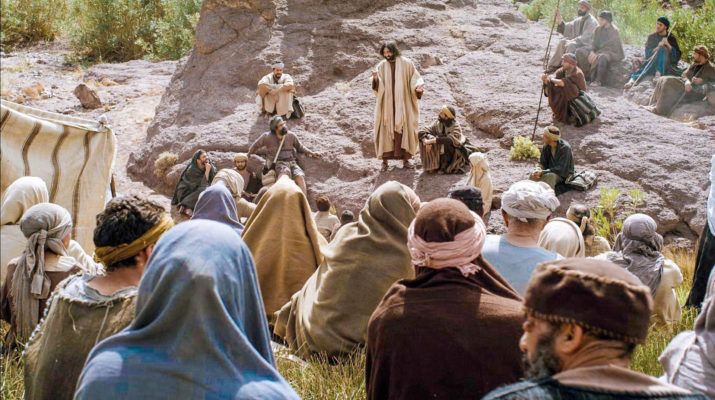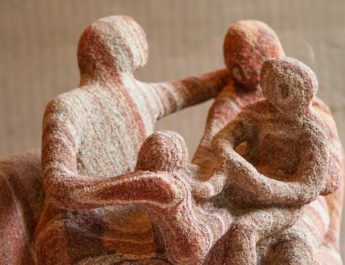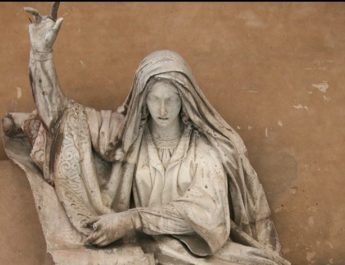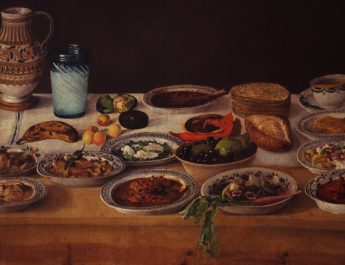Matthew 5:3-10
Narrative Lectionary
3 “BlessedA are the poorB in spirit,C for theirs is the kingdomD of heaven.E
A “blessed” = makarios. From makar (happy); from mak– (to become long or large). This is blessed, happy, fortunate. It is when God’s grace/abundance is extended.
B “poor” = ptochos. From ptosso (to crouch or cower as a beggar does). This is poor or destitute – someone who is extremely poor and bowed down because of a long struggle under poverty. Properly, it means bent over so figuratively it is someone who is deeply destitute and lacking tangible resources. This is a beggar – as extremely opposite a wealthy person as possible.
C “spirit” = pneuma. From pneo (to blow, breathe, breathe hard). This is wind, breath, or ghost. A breeze or a blast or air, a breath. Figuratively used for a spirit, the human soul or part of us that is rational. It is also used supernaturally for angels, demons, God, and the Holy Spirit. This is where pneumonia comes from.
D “kingdom” = basileia. From basileus (king, emperor, sovereign); probably from basis (step, hence foot; a pace); from baino (to walk, to go). This is kingdom, rule, authority, sovereignty, royalty, a realm.
E “heaven” = ouranos. May be related to oros (mountain, hill) with the notion of height. This is the air, the sky, the atmosphere, and heaven. It is the sky that is visible and the spiritual heaven where God dwells. Heaven implies happiness, power, and eternity.
4 “Blessed are those who mourn,F for they will be comforted.G
F “mourn” = pentheo. 10x in NT. From penthos (mourning, sorrow, sadness, grief); perhaps from pascho (to be acted on for good or ill; often used for negative treatment; properly, feeling strong emotions – especially suffering; can also be the ability to feel suffering). This is used for grieving a death, but also figuratively for loss of hope or end of a relationship. This is embodied grief that is readily apparent. This is grief as a feeling or the act of grieving.
G “comforted” = parakaleo. From para (beside, by, in the presence of) + kaleo (to call by name, invite, to name, bid, summon, call aloud) {related to keleuo (to command, order, direct); from kelomai (to urge on)}. This is to call to, summon, invite, request, or beg. It can also be exhort or admonish. Also, this can be encourage, comfort, or console. This word has legal overtones and is used of one’s advocate in a courtroom. It is the root of the name of the Holy Spirit “paraclete” is our advocate and comforter.
5 “Blessed are the meek,H for they will inheritI the earth.J
H “meek” = praus. 4x in NT. Related to praios (meek, gentle, kind); related to praotes (mildness kindness, meekness; being temperate – gentle, but strong; implies humility). This is gentle, meek, which implies humility.
I “inherit” = kleronomeo. 18x in NT. From kleronomos (heir); {from kleros (lot, portion, heritage; that share assigned to you; also a lot used to determine something by fate, chance, or divine will); {perhaps from klero (casting a lot) or from klao (to break in pieces as one breaks bread)} + the same as nomos (what is assigned – usage, law, custom, principle; used for the law in general or of God’s law; sometimes used to refer to the first five books of the Bible or the entire Old Testament; also used to refer to theology or the practice and tradition of interpreting and implementing the la This is earth, land, soil, region, country, the inhabitants of an area.zw of God); {from nemo (to parcel out, assign)}}. This is to acquire or get by inheriting.
J “earth” = ge. This is earth, land, soil, region, country, the inhabitants of an area.
6 “Blessed are those who hungerK and thirstL for righteousness,M for they will be filled.N
K “hunger” = peinao. From peina (hunger); related to penomai (working for a living; laborer, poor person; to work for daily bread); from peno (to toil to survive day by day). This is to hunger, be needy, or desire earnestly. It can be being famished in a definitive sense or in comparison to someone or something else. Figuratively, this means to crave.
L “thirst” = dipsao. 16x in NT. From dipsa (thirst); from dipsos (thirst). This is thirst in a literal or figurative sense. Can also mean keenly desire.
M “righteousness” = dikaiosune. From dikaios (correct, righteous – implies innocent; this is that which conforms to God’s notion of justice, uprightness); from dike (the principle of justice; that which is right in a way that is very clear; a decision or the execution of that decision; originally, this word was for custom or usage; evolved to include the process of law, judicial hearing, execution of sentence, penalty, and even vengeance; more commonly, it refers to what is right); may be from deiknumi (to show, point out, exhibit; figurative for teach, demonstrate, make known). This is judicial or divine approval of character or action. This is righteousness, justice, justness, divine righteousness.
N “filled” = chortazo. 16x in NT. From chortos (food, grass, grain, hay; a place for feeding, a court, garden; by implication, a pasture or vegetation). This is to feed, fodder, fill, or satisfy. It carries the sense of abundantly supplied food – even gorging on food.
7 “Blessed are the merciful,O for they will receive mercy.P
8 “Blessed are the pureQ in heart,R for they will seeS God.T
O “merciful” = eleemon. 2x in NT. From eleeo (to have pity on, show mercy to, be compassionate; often used for God’s grace); from eleos (mercy, pity, tender mercy, or compassion; generally understood in action by word or deed). This is merciful or compassionate.
P “receive mercy” = eleeo. Related to “merciful” in v7. See note O above.
Q “pure” = katharos. This is clean, clear, pure, unstained; clean in a literal, ritual, or spiritual sense; so, also guiltless, innocent or upright; something that is pure because it has been separated from the negative substance or aspect; spiritually clean because of God’s act of purifying.
R “heart” = kardia. Literally the heart, but figuratively mind, character, inner self, will, intention, thoughts, feelings. Also, the center of something. The word heart is only used figuratively in the Old and New Testaments. This is where “cardiac” comes from.
S “see” = horao. To see, perceive, attend to, look upon, experience. Properly, to stare at and so implying clear discernment. This, by extension, would indicate attending to what was seen and learned. This is to see, often with a metaphorical sense. Can include inward spiritual seeing.
T “God” = Theos. From Proto-Indo-European origins, meaning do, put, place. This is God or a god in general.
9 “Blessed are the peacemakers,U for they will be calledV childrenW of God.
10 “Blessed are those who are persecutedX for the sake of righteousness, for theirs is the kingdom of heaven.
U “peacemakers” = eirenopoios. 1x in NT. From eirene (one, peace, quietness, rest, peace of mind, harmony; a common farewell among Jews (i.e. shalom) as a well-wishing that included a blessing of health and wholeness for the individual; indicates when everything that is essential is joined together properly; peace literally or figuratively; by implication, it is prosperity –not in the sense of excessive wealth, but having enough from day to day); {perhaps from eiro (to join, tie together to form a whole)} + poieo (to make, do, construct, cause). This is literally peacemaker or peace-doer – someone who loves peace and works to bring it about.
V “called” = kaleo. Related to “comforted” in v4. See note G above.
W “children” = huios. This is son, descendant – a son whether natural born or adopted. It can be used figuratively for other forms of kinship.
X “persecuted” = dioko. From dio (put to flight). This is chase or pursue in an aggressive fashion. By implication, it is persecute. It can also be used positively for eagerly pursuing something.
Image credit: “Jesus Talks about Salt and Light” by LUMO Project.




